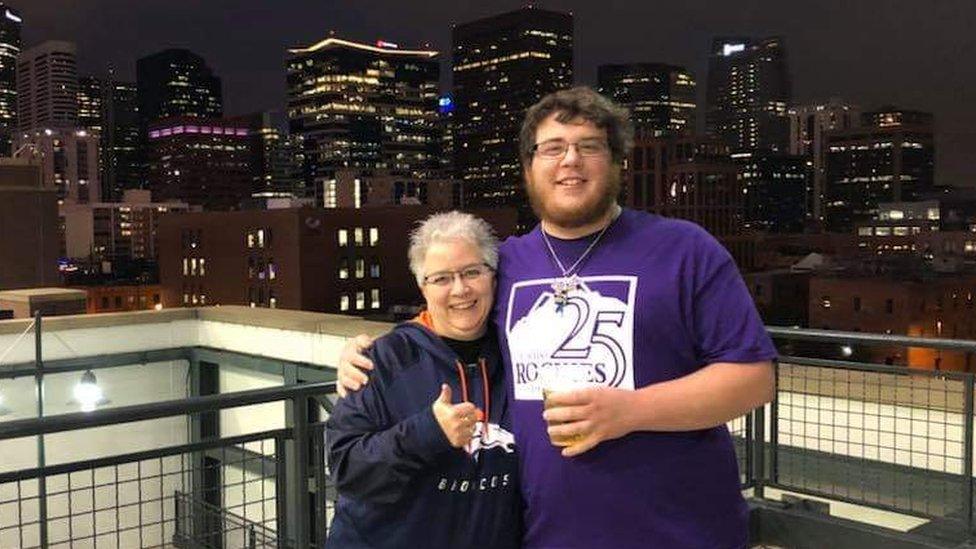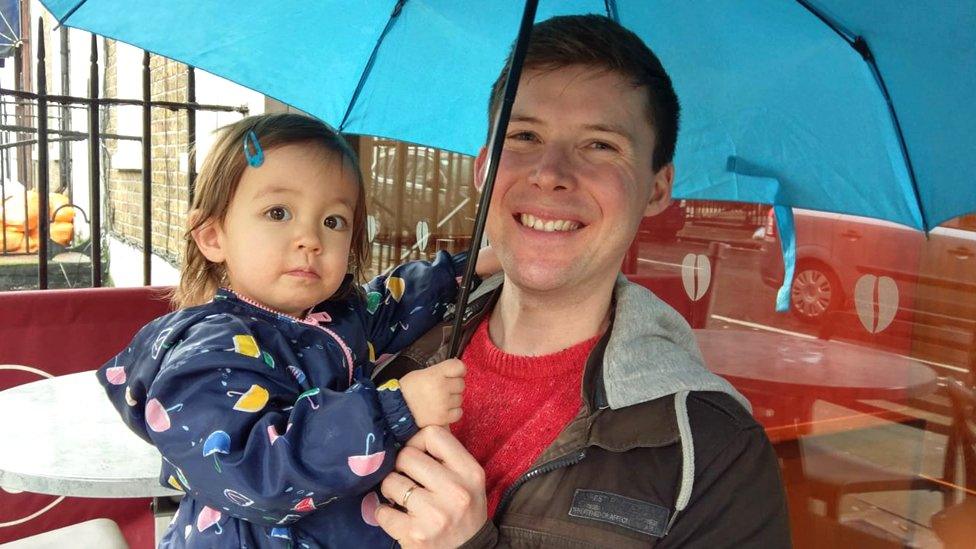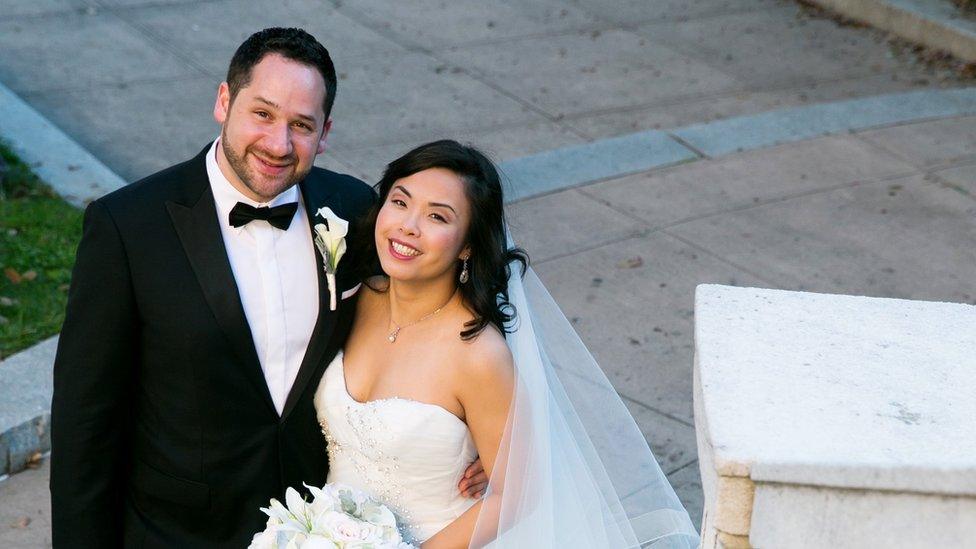Toxic masculinity: Life as a man isn’t always easy either
- Published

James Livitski, a Canadian graphic designer, says men should be able to talk about their feelings
Stories of the difficulties of being a modern woman are often told, but how much do you read about the downsides of being a man?
A searingly honest conversation unfolded online this week as men shared the negative impact of "toxic masculinity" on their lives.
It was a rare chance for many to express how societal expectations of toughness, sexual virility and emotional reserve lead to isolation, loneliness or just feeling uncomfortable around mates.
It all started when British columnist and feminist Caitlin Moran put out a call for men on Twitter to talk about the drawbacks of being a guy today.
We spoke to some people sharing their thoughts and feelings.
Allow X content?
This article contains content provided by X. We ask for your permission before anything is loaded, as they may be using cookies and other technologies. You may want to read X’s cookie policy, external and privacy policy, external before accepting. To view this content choose ‘accept and continue’.

A Super Bowl for feelings
James Livitski, from Toronto, Canada was really happy to see the topic so widely talked about on Twitter:
"I've been saying this forever. There's a stigma about men talking about feelings. We're born into thinking that a man should be 'tough', and push his feelings aside because it isn't 'manly'."

James Livitski, 32
James, 32, says he's seen countless times the impact of social norms that men should not be emotional or vulnerable.
"I've heard of so many relationships ending because the man can't express the way he feels.
"We need to be more open to listening to how a man is feeling and push more for them to understand that it's OK to feel things."
Although his own dad is a "really sensitive man", he says that many are not taught how do that without fear they will be judged.
"We're all humans and we all feel. You shouldn't never be afraid to say what's on your mind. Men should have a Super Bowl for feelings," he suggests.
Increased attention has been paid to men's mental health in recent years.

You might also like:

British initiative the Campaign Against Living Miserably (CALM), external aims to challenge a culture that prevents men seeking help when they need it, highlighting that in Britain the single biggest killer of men under 45 is suicide.
Men and women experience many of the same mental health issues, but men with depression or anxiety may hide emotions and express anger or aggression instead, according to the US National Institute of Mental Health., external
Missed connections
Another pressure is that men who express their love for family or friends are considered feminine and emasculated, according to Phil Chan, a digital artist from California.
"My dad never told me that he loved me, even though I know he does. He hadn't hugged me either. Even now that he is in his eighties, I would love to hear him say it."

Phil Chan: "I think the #Metoo movement has opened up communications between genders"

"After I told my closest friends how I feel about them, if anything, it brought us closer together. We hug on a regular basis!"
Phil also explained that when caring for his baby nephew, women in public would assume he was clueless about looking after an infant.
At a party with his nephew, a group of women criticised him, giving instructions on how to "properly" change and hold the baby. He worries this negatively affects men's hopes about fatherhood.
"I do think if us men were taught to be more vulnerable, we could be more compassionate and empathetic," he suggests.

Mark is a software developer in Sydeny, Australia

Mark Pursey, 46, from Sydney, Australia, also suggests that men find it difficult to foster friendships when they meet a new person, in stark contrast to many women who enthusiastically exchange contact information.
"I've definitely got a mental list of 'missed connections' where I met some guy at a random thing and got on really really well. Then it's like 'see you later dude' and we never meet again."
He says that in many cases this overwhelmingly leads to loneliness and isolation.
Mark says that's because men are "not learning the emotional labour stuff", adding, "we like to show off but not put in the boring maintenance work in relationships.
"It's like we still need play dates organised for us."
Sexual virility
Another issue talked about is men feeling uncomfortable when peers blatantly check out or sexualise women, commenting on their appearance.
"It can get toxic easily, and as a guy we're expected to contribute. It's happened a lot and it's so uncomfortable. Just being around that conversation makes me feel dirty," commented Alan Gretch, 21, from the US state of Nebraska.

Alan is completing a Masters in human services to become a counsellor
Alan says these conversations are common especially when there are no women around: "They can range from 'this person is hot' to more graphic descriptions of girls."
He says it's difficult to challenge men when these conversations begin. "It's either bully, be bullied, or stay silent. It's a no win situation," Alan explains.
Anxiety about expectations of sexual virility was raised by several contributors on Twitter.
"The idea that if you're not: drinking heavily, trying to shag everything that moves, living and breathing sport, solving problems with violence, competing with other men to be the 'alpha', then you're not a man," wrote Neil Walsh.
Another user added that assumptions of sexual advances are often made when he tries to be "just friends" with women, adding "Yes I know there are very good reasons for this."
I don't want to be a daddy
Gin Lowdean, from Edinburgh, Scotland, revealed that her four-year-old son told her he doesn't want to be a dad when he grows up. Instead he's "excited to be a mummy".
When Gin pointed out that most men don't become mothers, he became sad because "Daddies have to work all the time, they never get to dance and nobody hugs them."
Gin explained that she was shocked because her husband is very affectionate with his sons, but she presumes her son picked up the idea from nursery and television.
"His dad was devastated, he hugs him all the time and loves to dance," she explained, adding that to try to rectify the issue by purchasing books about how to express feelings and stories that challenge traditional masculinity.
By Georgina Rannard, UGC & Social News
- Published11 July 2018

- Published9 October 2018

- Published9 October 2018
